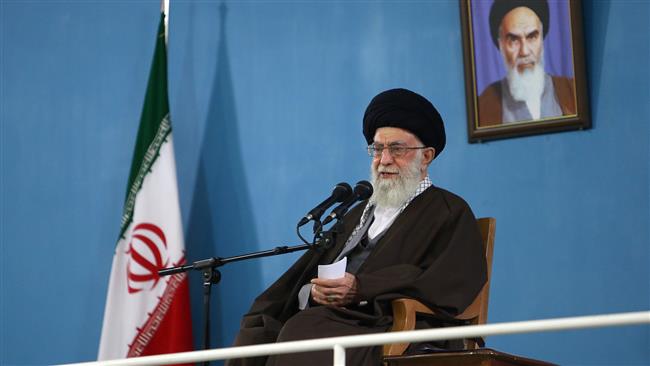PHOTO: Supreme Leader on Saturday — “A widespread front of the enemy is standing before us”
LATEST
- Poet Sedighi Released After Brief Detention
- Gulf States Back Saudi Arabia vs. Iran
- Deputy Governor Sacked Over Saudi Embassy Attack
The Supreme Leader has shown his concern over February’s elections in Iran, saying for the first time that some Iranians might not support his rule.
Ayatollah Khamenei told an audience in the holy city of Qom:
Even those who do not believe in the system participate [in elections] for the sake of the country’s credit. There might be people not accepting me, but they also participate in elections.
The votes on February 26 are for both Parliament and the Assembly of Experts, the body which chooses the Supreme Leader. Hardliners and some conservatives are pursuing a fierce campaign to prevent success by candidates linked to President Rouhani and allies such as former President Hashemi Rafsanjani. They are claiming that some politicians and activists, including Rafsanjani, are involved in “sedition” to undermine the Islamic Republic.
However, the hardliners and conservatives have yet to establish a bloc which can be assured of defeating a challenge by the Rouhani-Rafsanjani supporters, who may ally with Iran’s reformists. The tension is reminiscent of the 2013 Presidential campaign, when failure to unify around a single candidate meant that — following the disqualification of Rafsanjani from standing — his protégé Rouhani was able to win a surprise victory.
The Supreme Leader also said in 2013 that Iranians who did not “believe in the system” should vote. However, he did not go as far as to say that those people might not believe in his position.
While displaying concern, Khamenei supported the hardline-conservative warnings of “sedition”. He linked this year’s campaign to the disputed 2009 Presidential election which caused mass protests, after Mahmoud Ahmadinejad was declared the winner despite widespread claims that the result was manipulated:
The events in 2009 were of the enemy’s new initiative against the Revolution, with election of a government which was not favored by the US. The minority who had lost the election was brought to the streets….It was an unsuccessful color revolution coup d’etat.
The Supreme Leader warned, “A widespread front of the enemy is standing before us, from heads of the Zionist regime and US Government to Daesh [the Islamic State] and Takfiri agents. All their analyses are focused on ways to uproot the robust tree of the Islamic Revolution.”
Poet Sedighi Released After Brief Detention
Poet Hila Sedighi was freed on Saturday night, following her arrest the previous day.
No details were given of Sedighi’s release. The award-winning poet was detained on Friday at the airport upon her return to Iran from a trip abroad.
See Iran Daily, Jan 9: Award-Winning Poet Sedighi Arrested
Gulf States Back Saudi Arabia vs. Iran
The five other members of the Gulf Cooperation Council have expressed “total support” for Saudi Arabia in its diplomatic row with Iran.
The GCC — Kuwait, Oman, the UAE, Qatar, and Bahrain as well as Saudi Arabia — “forcefully condemns the attacks on Saudi diplomatic missions in Iran”, a statement said on Saturday. It said Tehran’s criticism had “directly incited the aggressions targeting Saudi diplomatic missions”, such as last Saturday’s attack on the Saudi Embassy in Tehran.
The statement, following a special meeting of the group’s foreign ministers, criticized “Iranian interference in Saudi Arabian affairs”. The members “totally supported decisions taken by Saudi Arabia to combat terrorism” with “total confidence in the independence and integrity of Saudi justice”.
Saudi Arabia has severed all diplomatic and commercial ties with Iran. Bahrain also cut diplomatic relations, Kuwait and Qatar recalled their ambassadors, the UAE downgraded its links, and Oman condemned the attacks.
Saudi Foreign Minister Adel al-Jubeir said on Saturday, “The escalation is coming from Iran, not from Saudi Arabia or the GCC. We are evaluating Iran’s moves and taking steps to counter them….Things will be clearer in the near future.”
The Arab League will hold an emergency meeting on the issue on Sunday.
Deputy Governor Sacked Over Saudi Embassy Attack
The Deputy Governor of Tehran Province has been fired after last weekend’s attack on the Saudi Embassy in the Iranian capital.
Interior Ministry spokesman Hossein-Ali Amiri said Safar-Ali Baratlou, responsible for security affairs, was dismissed for dereliction of duty after a crowd burned and ransacked the Embassy on January 2.
Anger had been stoked in Iran by Saudi Arabia’s execution of 47 detainees, including Shia cleric Sheikh Nimr Baqr al-Nimr, earlier in the day. However, the withdrawal of security around the Embassy indicated that elements in the regime might have supported the demonstration and attack.
Amid an internal fight over how to respond to the attack — including accusations from Friday Prayer Leaders that Saudi Arabia arranged the assault on its own Embassy — President Rouhani has called for a full investigation to identify and punish the perpetrators.
Amiri indicated on Saturday that Deputy Governor Baratlou had previously received notices about poor performance.

